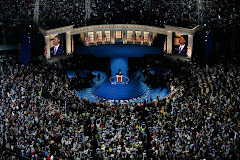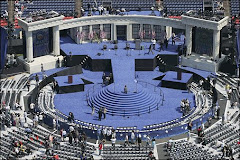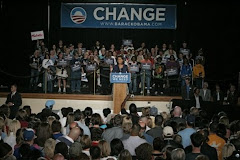The second comes from the inspiration of Dan Slater’s example where he has provided his personal experiences in his role as a welcomed information resource for party members. I think I too have a unique view sitting on four committees while also being part of a extensive local network. If you don’t like this simply tell me and I will remove you from my list. Also I intend to republish these email posts on my blog; www.obamaguy.blogspot.com.
- State Executive Committee
- State Central Committee
- County Executive Committee
- County Precinct Co-Chair
- Activist volunteer leader with Organizing for America
Before I get started with my State Central Committee Report here are some upcoming local party and activist events you may want to pen in your calendar: I think that is important.
· Wednesday, March 11th at 6 PM, EPC Precinct Development Committee will meet at Poor Richard’s Bookstore located at 320 No. Tejon. The outgoing super-ubber Chairperson, Karen Davidson will hand over the gavel to Linda Martin. I am member of this committee and we will find out how the new EPC Executive Counsel will reform it going forward including new stuff about HD leadership and official handbook changes. krd555@comcast.net
· Thursday, March 12th at 7 PM, Nick Solter a fellow blogger and progressive Democratic friend is hosting a presentation and discussion on a Single-Payer Approach to Universal Health Coverage. It is a kickoff for a CO Springs chapter of Health Care for All Colorado. Location: High Plains Church Unitarian Universalist (1825 Dominion Way, 80918). Contact: Nick Solter (719 488-2083) nicholas.solter@gmail.com
· Thursday March 12th Decision 2009: Colorado Springs Candidate and Issue Election Forum located at the Carnegie Reading Room, Penrose Library, 20 N Cascade Ave. Free and open to the public, call Citizens Project at 520-9899.
· Thursday March 12th Organization for America Conference Call, 6:30 PM
· Friday, March 13th, at 6:00 pm, St. Patrick's Day Party and Fundraiser for the EPC Democratic Party. The event will be held at the Garden of the Gods Club. There will be a silent and live auction, Irish music and rumored Senator Michael Bennet speaking. (He told me personally he was coming to the event!)
· Saturday, March 14th, at 12:00 pm St. Patrick's Day Parade in Downtown Colorado Springs, (Tejon St) Join local fellow Democrats in the parade. Line up will begin at 11:00 am.
· Sunday, March 15th, 3-5:00 pm The Candidate Development Committee for the EPC Democratic Party is hosting the Progressive Majority for the development of candidates and campaign workers. Located at the Carnegie Room at Penrose Library, 20 No. Cascade Ave, John Morris 473-8713 or john@peakdems.com.
· Monday, March 16th at 6 PM EPC’s Executive Committee will be meeting as a new group. On top of the agenda is the new HD leadership format along with new VAN responsibilities plus the standing item regarding the proposed Exec Director Location is at the EPC Dem HQ located at 25 No. Iowa St. alice@peakdems.org
· Monday, March 16th, 6:00-7:00 pm James Crowe on loan from Washington State’s SEIU will be holding a presentation about the Employee Free Choice Act and Healthcare Reform located at 4303 Stonesthrow VW 80922, 232-4974 RSVP to Michelle
2009 State Central Committee Report
Other Central Committee Members include Annie Bowen, Judy Fender, David Justice, Mike Makish, Tom Niemen, Steve Smith, and Val St. Cloud. Again I am still being introduced to many people and if I didn’t recognize you there on Sunday please give me a call or email me.
I was able to ride up with Alice Hines and Jennifer Trujillo-Sanchez, where Jennifer was very kind to drive. This allowed me to get to know both these capable women better as they were also one of my Obama compatriots last year. I think we all enjoyed each other’s company. During the trip we all decided to start trying to figure out how to a better provide group transportation to Denver for meetings like this. We need to rethink the carbon footprint individual driving does, the respective individual costs and the missed opportunity to get people together and learn how to better work as a team. I will take this up at the upcoming County Executive Committee Meeting later this month. One idea is to model off what a few northern CO counties do with providing partnered bus options where we could team up with the Arkansas River Valley county parties.
Meeting Reports: Our car pool troupe didn’t make it to the CD-5 reorganization meeting that convened at 10:30 AM. I did talk with Dan Slater, who later that afternoon was re-elected by acclamation to his 3rd term as the State Party’s 1st Vice Chair, where he informed me that his wife Brandy was elected to CD-5 Chair. Hal Bidlack then told me he too was elected to the post of CD-5’s 1st Vice Chair. I am sure our capable county’s 2nd Chair, Lois Fornander, will announce the rest of the executive officers who were elected to lead our Congressional District.
The main event, the State Party Central Committee convened at 1 PM whereupon w re-elected by acclamation Pat Waak to her historic 3rd term as our State Party Chair. The Denver Post has a nice article on the event here: (http://www.denverpost.com/
She then took the gavel and allowed a parade of Colorado Democratic Party heavyweights to make speech at the podium starting with Senator Mark Udall. The senior senator made a personal point for all of us to keep calling him Mark instead of his new title, senator.
Colorado’s junior senator, Michael Bennet followed Mark with a stirring speech that he outlined the basic “W” hole that was left behind by the past President. Specifically increasing the deficit from $5T (where we had a revenue surplus) to the current $10T deficit and a revenue shortfall. That along with a deep recession and two wars and enough said. Mike Maday and I sat directly behind Senator Bennet as he waited to take the podium. Before the meeting got under way we joked with his staffers about making certain the senator visited often El Paso County where he turned around and said he was visiting the county Friday night. (Is that a scoop?) Of course Mike and I didn’t bend the ear of our new senator like our own Allen Nye who had an extensive conversation with him beforehand.
Congressman Perlmutter followed our US Senators with a strong message of about the party teamwork that has resulted in Colorado going from red to blue in just these six years. After Perlmutter they introduced the new Congressman from Boulder, Jared Polis who came to the podium to speak a few words that the choir liked. Governor Ritter was represented by one his cabinet members as I didn’t get his name. The Governor I was told was traveling in Europe.
Whereupon the many standing ovations the actual Reorg meeting resumed, where we got back to business re-electing the entire executive slate without opposition. Dan Slater made the biggest splash when he displayed a PowerPoint slide of how much the Democrats have grown since 2002. Back before 2002 there were only a few pocket of counties where Democratic officials were holding office, now only four counties, Park, Teller, Douglas and Elbert, do not have an elected Democratic Official. It was a stunning graphic of a regional realignment. My note was that if you take out El Paso and Douglas Counties from the statewide races in 2008, Colorado is voting 57-42% Democratic. Think about that.
We received reports from the Initiative Chairs that included Latino, Disability, Young Democrats, African-American, Progressive, and Stonewall Democrats and then we created a new initiative Labor. Then by acclamation we approved a motion to endorse the Employee Free Choice Act (EFCA). Things seemed to be going smooth and then we came to the meeting to consider changing some rules.
Well the seemingly sleepy Democratic blood immediately began boil as questions arose regarding a few “curious” proposals. There were questions as to jurisdiction redefinitions regarding disputes in controversies, secret balloting when it came to elected delegates changes to alternate compositions (reducing alternates by 50%) multiple county state senate and house district jurisdictions. There was actually a meeting breaking out of celebration!
Jan King I had immediate objections beforehand in reducing the alternates from caucuses to the convention/assemblies. The Rules Chairman when asked why the need for change was not informative to my liking, nor many in the assemblage when she said either “there were too many or too few alternates”. The reasoning just didn’t cut it. After a few other questions that were beginning to resemble more of a discussion, Dan Slater moved the body to the discussion phase.
The problem I immediately saw was the inherent voting strategy laid out for the meeting where those seeking to make these rules changes wanted to group all the changes into one resolution. There was a motion to disengage each rule change into separate considerations, but that was voted down in a fairly close voice vote. So discussion began, I was the second person to speak at the microphone and object to the alternate reduction where I asked the body who here was an alternate through the 2008 process. With almost 300 in attendance a good 1/3rd rose, I then told them that half of you would not have been able to participate in the process. I then said that this year represented a political alignment both in party affiliation and in citizen participation and any dampening of participation was bad policy. I got a good applause. After me a chorus of objectors to the provision lined up to the microphone, where upon a savvy politico offered a motion to cut to the chase. She sought to table the rule changes (for a future meeting) and get the problems out of the way so we could adjourn. The Central Committee voted in acclamation to table the rules changes.
My reading of the CDP By-Laws state that the Rules Committee shall be formed 10 days after Pat Waak’s election. New rule or amendments than must be submitted to the standing committee 30 days prior to the next Central Committee Meeting where upon the Committee Members are to receive a copy of the proposed changes 10-days beforehand in the “Call”.
In my opinion this was an unfortunate and presumptive action by those in the Rules Committee and Party Officers. I witnessed an almost similar pushback by our own County Central Committee in January regarding the change of rules regarding removing absent or unresponsive Precinct co-chairs as immediately the body of persons recoiled to examine whether there was a misguided effort to dampen or lesson the opportunity to participate in the democratic process. The party regulars who toil and volunteer long hours might not recognize but this attention and desire to keep even part time activists a foot in the game. I assessment is that people now know how important it is to be part of the process even though they might not be fully engaged as a full time volunteer.
As a minor party leader I am hearing this loud and clear. I want to thank Jan King to immediately objecting to this provision as we sat beforehand reading the agenda and proposed rule changes. To those party leaders proposing rule changes, to them well-meaning and even appropriate stuff like house-cleaning or what not be careful to understand the environment that has now changed in America and Colorado. Also be prepared that this part of the meeting might suddenly turn into a contentious even challenging affair so be wise to present the changes in a clear and appropriate manner.
After the motion to table the rules amendments the Central Committee Meeting adjourned for us since EPC had already elected its State Executive Committee delegation back on January 30th. Our executive committee includes; Hal Bidlack, Mike Maday, Jennifer Trujillo-Sanchez, Diane Whitley and myself who are part of the Central Committee and all in attendance last Sunday, plus Jay Fawcett, Jay Ferguson, Renee Hartslief, and Michelle Maksimowicz, a truly capable sample of our county’s growing leadership. From there we broke up, happy to see this standing room crowd that easily made quorum clearly still full of political energy ready to permeate back to our home counties. That is my report, if you have anything to add simply write me back or contribute to my blog.







